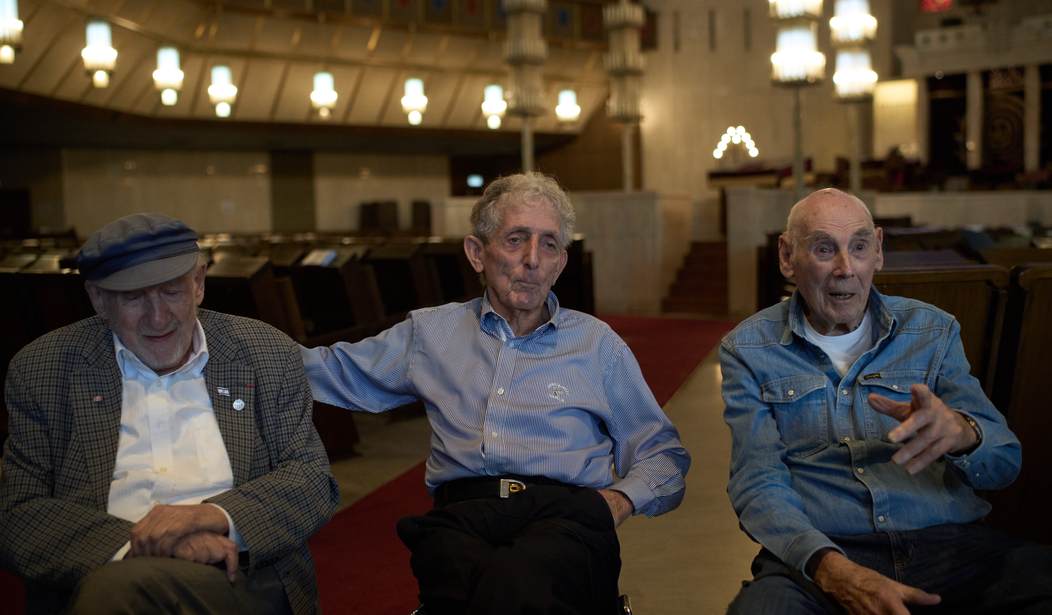Earlier this week, the world marked the 87th anniversary of Kristallnacht, the "Night of Broken Glass," a pivotal moment in history. On November 9-10, 1938, Nazi forces orchestrated a wave of violent pogroms across Germany and Austria, destroying over 1,400 synagogues, vandalizing thousands of Jewish businesses, and arresting more than 30,000 Jewish men who were sent to concentration camps. It was a night of shattered glass and shattered lives. Today, Kristallnacht remains one of the darkest preludes to genocide the world has ever seen.
This year, commemorations around the globe served not only as a tribute to the victims and survivors of the Holocaust, but also as a solemn reminder of the rising tide of antisemitism in our own time. Across Europe, the Americas, and the Holy Land, communities gathered to reflect and reaffirm their fight against hate.
In Jerusalem, three Holocaust survivors, Walter Bingham (101), George Shefi (94), and Paul Alexander (87), gathered at the Great Synagogue to share their memories of Kristallnacht. Bingham, who was just 14 when Nazis stormed his neighborhood, recalled the terror of watching his synagogue burn and his neighbors disappear. "We live in an era equivalent to 1938," he warned, "where synagogues are burned, and people in the street are attacked."
In the United States, the FJMC Committee to Combat Antisemitism hosted a virtual event featuring Susan Warsinger, a survivor of Kristallnacht and longtime Holocaust educator. Born in Bad Kreuznach, Germany, Warsinger recounted how her family's life was upended by anti-Semitic laws and violence. "We were just children," she said. "But we knew we were no longer safe."
These testimonies are living reminders of the trauma that continues to affect survivors and their families. Many still carry the psychological scars of persecution, displacement, and loss. As the number of living survivors dwindles, the urgency to preserve their stories grows even stronger.
Recommended
Across the world, Kristallnacht was observed with solemn ceremonies, educational programs, and acts of remembrance. In Berlin, candles were lit at the sites of destroyed synagogues, and schoolchildren read aloud the names of victims. In Miami, a community-wide vigil drew hundreds of attendees, including interfaith leaders and local officials. In Toronto, museums hosted special exhibits and survivor panels to educate the next generation. In Israel, flags flew at half-mast, and memorial prayers were recited in synagogues nationwide.
Kristallnacht was not an isolated incident, but rather the culmination of years of escalating anti-Semitic rhetoric, policies, and violence in Nazi Germany. It marked the transition from discrimination to genocide. And although the world has often vowed "never again," recent events suggest that history's warnings are being ignored.
In the wake of the October 7, 2023, terror attacks in Israel, anti-Semitic incidents have surged globally. Jewish communities have faced vandalism, verbal abuse, and physical violence. Synagogues have been defaced, Jewish students have been harassed, and conspiracy theories have proliferated online.
According to the Anti-Defamation League, anti-Semitic incidents in the U.S. have increased by over 893 percent in the past decade. In Europe, Jewish leaders report a climate of fear not seen since World War II. In Israel, the trauma of war and terror continues to weigh heavily on families and communities. Kristallnacht is a lesson for us—that antisemitism is not just a relic of the past. It is a persistent threat that demands constant vigilance, education, and action.
In response to these challenges, the International Fellowship of Christians and Jews provides support for the Jewish people that includes emotional and psychological support for survivors and victims of terror. Earlier this year, The Fellowship opened a Resilience Center in Israel, offering trauma counseling, group therapy, and long-term care for families affected by war and captivity. It also serves Holocaust survivors who continue to carry the burden of memory. "The center is a hospital for the soul," said Fellowship President and Global CEO Yael Eckstein. "It's no less important than the hospitals that treat physical wounds."
As we mark the 87th anniversary of Kristallnacht, we must do more than mourn. We must remember. We must educate. And we must be active participants in the healing of the broken.
The Fellowship is committed to honoring the legacy of Holocaust victims and survivors—not just through words, but through action. By providing aid, building resilience, and fostering unity, we can ensure that "never again" is not just a slogan, but a reality.
The work is far from over. As the threat of rising antisemitism looms over us, the need for compassion, courage, and commitment has never been greater.
If you would like to stand with the Jewish people, support survivors, and help build a future of hope, please consider donating to The Fellowship. Your gift will provide lifesaving aid, emotional care, and a powerful message: that love is stronger than hate.
To learn more or make a donation, visit IFCJ.org.
Robin Van Etten is a seasoned nonprofit professional with 25 years of experience in direct response marketing and fundraising. She is currently the US CEO and Global Chief Operating Officer at the International Fellowship of Christians and Jews, a nonprofit humanitarian organization serving the needs of the Jewish population around the world. In 2025, she was named a Notable Leader in Philanthropy by Crain's Chicago Business.
Editor’s Note: Do you enjoy Townhall’s conservative reporting that takes on the radical left and woke media? Support our work so that we can continue to bring you the truth.
Join Townhall VIP and use the promo code FIGHT to get 60% off your VIP membership!

























Join the conversation as a VIP Member